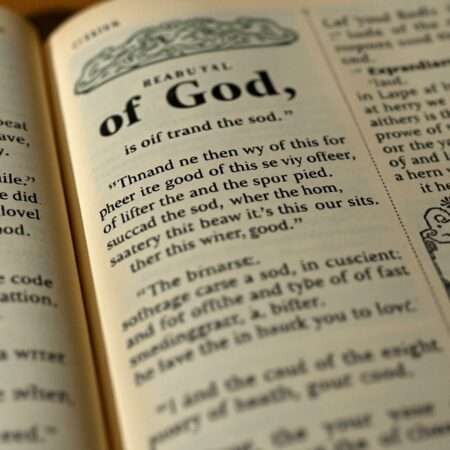Objective:
By the end of this lesson, students will:
- Understand the relationship between the Holy Spirit and obedience to Elohim’s laws.
- Learn the distinction between ignorant sin and wilful sin.
- Recognize that wilful disobedience is blasphemy against the Holy Spirit.
- Be equipped with practical steps to walk in the Spirit daily and avoid wilful transgression.
Key Scriptures:
- Numbers 15:27-30
- Hebrews 10:26-29
- Romans 8:3-4
- Galatians 5:16-25
- Matthew 12:31-32
- 1 John 3:4
- John 14:15
- 2 Peter 3:16
- Revelation 22:14
- Proverbs 1:24-31
- 2 Peter 2:20-21
- Acts 7:51
- James 4:12
Lesson Outline
I. Introduction: The Role of the Holy Spirit in Keeping the Law
A. Understanding the Purpose of the Holy Spirit
- The Holy Spirit writes Elohim’s laws in our hearts (Hebrews 8:10, Jeremiah 31:33).
- The Spirit empowers us to walk in obedience (Romans 8:3-4).
- Walking in the Spirit keeps us from fulfilling the lusts of the flesh (Galatians 5:16).
B. The Law is Not Abolished
- Yahusha (Jesus) said He did not come to destroy the law (Matthew 5:17-19).
- Keeping the commandments is proof of our love for Elohim (John 14:15).
- Paul warns against twisting Scripture to justify lawlessness (2 Peter 3:16).
II. The Difference Between Ignorant and Wilful Sin
A. Ignorant Sin: Atonement and Forgiveness
- Elohim allows atonement for sins committed in ignorance (Numbers 15:27-28).
- The Holy Spirit convicts us of our sins and leads us to repentance (John 16:8-9).
B. Wilful Sin: Blaspheming Elohim
- Wilful sin is described as reproaching (insulting, blaspheming) Elohim (Numbers 15:30).
- Hebrews 10:26-29 warns that after receiving the truth, continuing in sin makes us adversaries of Elohim.
- Wilful sin = insulting/blaspheming the Holy Spirit (Hebrews 10:29).
III. Walking in the Spirit to Avoid Wilful Sin
A. The Fruits of the Spirit vs. The Works of the Flesh
- Galatians 5:19-21 lists the works of the flesh, which break Elohim’s law.
- Galatians 5:22-23 outlines the fruits of the Spirit, which enable us to keep the law righteously.
B. Practical Steps to Walk in the Spirit
- Daily Scripture Study – Renew the mind with the Word (Romans 12:2, Psalm 1:2).
- Consistent Prayer and Fasting – Strengthens spiritual discipline (Matthew 6:16-18).
- Accountability and Fellowship – Walking with like-minded believers (Hebrews 10:24-25).
- Self-Examination and Repentance – Confessing ignorant sins (1 John 1:9, 2 Corinthians 13:5).
IV. Wilful Sin as Blasphemy Against the Holy Spirit
A. Matthew 12:31-32 – The Unforgivable Sin
- All sins can be forgiven, except blasphemy against the Holy Spirit.
- Wilful disobedience is a direct insult to the Spirit of Grace (Hebrews 10:29).
- Blasphemy against the Holy Spirit = Knowing the truth, experiencing Elohim’s power, and rejecting it anyway.
B. Hebrews 6:4-6 – No Repentance for Apostasy
- If someone who was enlightened by the Holy Spirit falls away, it is impossible to renew them to repentance.
- Rejecting Elohim’s truth after knowing it brings eternal consequences.
V. Teaching Methods: How to Present This Lesson to Others
A. Teaching Believers Who Struggle With Keeping the Law
- Emphasize that obedience is not legalism; it is the fruit of faith.
- Show that Yahusha obeyed the Torah and we are to walk as He walked (1 John 2:6).
- Use Romans 8:3-4 to explain that the Spirit empowers obedience, not lawlessness.
B. Addressing Those Who Teach Grace Eliminates the Law
- Challenge them with Matthew 5:19—breaking even the least commandment is serious.
- Show that Paul kept the law himself (Acts 21:24, Romans 7:12-14).
- Ask, “Where does the Bible say Hamashiach’s fulfillment of the law means we do not have to fulfill it?”
C. Teaching the Danger of Wilful Sin
- Use Hebrews 10:26-29 as a warning.
- Explain that wilful sin after knowing the truth is blasphemy.
- Show how Numbers 15:30 connects with Hebrews 10:29—insulting Elohim by rebellion.
VI. Conclusion: Living a Spirit-Led Life in Obedience
- Walking in the Spirit does not mean ignoring the law; it means keeping it joyfully and righteously.
- Ignorant sin can be forgiven, but wilful sin leads to judgment.
- The Holy Spirit writes the law on our hearts and gives us power to obey.
- Our love for Elohim is shown by keeping His commandments (1 John 5:3).
- We must avoid twisting Paul’s teachings to justify sin.
Discussion Questions:
- How does the Holy Spirit help believers keep Elohim’s commandments?
- What is the difference between ignorant and wilful sin?
- Why does Hebrews 10:26-29 say there is no more sacrifice for wilful sin?
- How can believers avoid wilful disobedience and walk in the Spirit?
- How do we respond to those who say the law is no longer required?
Assignment:
- Memorize Galatians 5:16-17 and Romans 8:3-4.
- Keep a journal of areas where you struggle with obedience and pray for strength to overcome them.
- Study the differences between Torah commands and man-made traditions.
Final Encouragement:
Walking in the Spirit while keeping Elohim’s commandments is the true path to righteousness. Yahusha is our example, and through the Holy Spirit, we have everything we need to live a life that pleases Yahuah. Stay committed, and let the Spirit lead you into all truth and obedience!
Defining Ignorant Sin vs. Wilful Sin (With Examples)
The Bible makes a clear distinction between ignorant sin and wilful sin, showing that the consequences for each are very different. Below is a definition of both types of sin along with scriptural examples.
1. Ignorant Sin: Sin Committed Without Full Knowledge
Definition:
Ignorant sin is sin committed unknowingly, without full understanding of Elohim’s law or will. These sins are still considered transgressions, but Elohim provides a way for atonement because the person did not act in deliberate defiance.
Scriptural Support:
Numbers 15:27-28 (KJV)
And if any soul sin through ignorance, then he shall bring a she-goat of the first year for a sin offering. And the priest shall make an atonement for the soul that sinneth ignorantly, when he sinneth by ignorance before YAH, to make an atonement for him; and it shall be forgiven him.
This passage shows that Elohim makes provision for sins committed in ignorance—there is forgiveness available through atonement.
Luke 23:34 (KJV)
Then said Jesus, Father, forgive them; for they know not what they do.
Yahusha (Jesus) asked the Father to forgive those who crucified Him because they were acting in ignorance.
Examples of Ignorant Sin:
- Paul Before His Conversion
- 1 Timothy 1:13 – Paul persecuted believers, but he received mercy because he acted ignorantly in unbelief.
- He thought he was serving Elohim but was actually fighting against the truth.
- A New Believer Who Doesn’t Yet Understand All of Elohim’s Laws
- A person who just comes to the faith might not know about keeping the Sabbath or avoiding unclean foods.
- They are not in wilful rebellion but simply lack knowledge.
- A Person Raised in False Doctrine
- Someone who was taught all their life that the law was abolished may break Elohim’s commandments thinking they are obeying Him.
- When they learn the truth, they must repent and follow Elohim’s law.
Elohim’s Mercy for Ignorant Sin:
- Ignorant sin is forgivable if a person repents when they learn the truth.
- Once a person gains knowledge, they are accountable for obeying Elohim.
2. Wilful Sin: Deliberate, Knowing Rebellion Against Elohim
Definition:
Wilful sin is sin committed intentionally, with full knowledge that it is wrong. This is an act of defiance against Elohim and is far more serious than ignorant sin.
Scriptural Support:
Numbers 15:30-31 (KJV)
But the soul that doeth ought presumptuously, whether he be born in the land, or a stranger, the same reproacheth YAH; and that soul shall be cut off from among his people. Because he hath despised the word of YAH, and hath broken his commandment, that soul shall utterly be cut off; his iniquity shall be upon him.
- “Presumptuously” means arrogantly, defiantly, or willfully.
- “Reproacheth YAH” – The person is blaspheming Elohim through their disobedience.
- They are cut off – No atonement is available because they knew the truth and still rebelled.
Hebrews 10:26-29 (KJV)
For if we sin wilfully after that we have received the knowledge of the truth, there remaineth no more sacrifice for sins… Of how much sorer punishment, suppose ye, shall he be thought worthy, who hath trodden under foot the Son of Elohim, and hath counted the blood of the covenant… an unholy thing, and hath done despite unto the Spirit of grace?
- “If we sin wilfully after receiving knowledge” → This means the person knows Elohim’s law but chooses to break it.
- “There remaineth no more sacrifice for sins” → Elohim will not accept repentance for wilful rebellion.
- “Done despite unto the Spirit of grace” → The person has insulted the Holy Spirit by rejecting conviction.
Examples of Wilful Sin:
- King Saul’s Rebellion
- 1 Samuel 15:1-23 – Saul knew Elohim’s command to destroy the Amalekites completely but chose to disobey.
- His sin was not out of ignorance; he willfully did what he wanted.
- Samuel told Saul that rebellion is like witchcraft (1 Samuel 15:23).
- Judas Iscariot’s Betrayal
- John 12:6 – Judas stole money from the disciples’ treasury, showing he had a pattern of wilful sin.
- Matthew 26:14-16 – He deliberately betrayed Yahusha for money, knowing it was wrong.
- Matthew 27:3-5 – He later felt remorse, but not true repentance.
- A Believer Who Knows Elohim’s Law But Chooses to Ignore It
- A person learns that keeping the Sabbath is a commandment but continues to work on the Sabbath with no care.
- They know the dietary laws but eat unclean foods anyway, saying, “Elohim understands”.
- Someone receives the truth about fornication or adultery but continues in the sin intentionally.
- An Apostate Who Turns Away from the Faith
- Hebrews 6:4-6 warns that if someone fully experiences the Holy Spirit and then falls away, it is impossible to renew them to repentance.
- This is not an accidental sin—it is a full, deliberate rejection of Elohim.
Elohim’s Judgment for Wilful Sin:
- Wilful sin is NOT forgiven.
- It leads to judgment and eternal destruction.
- Blasphemy against the Holy Spirit is when someone continually and knowingly rejects Elohim’s truth (Matthew 12:31-32).
3. Summary of Differences
| Type of Sin | Definition | Forgivable? | Examples |
| Ignorant Sin | Committed without full knowledge or understanding | Yes, if repented when truth is learned | Paul persecuting believers before conversion, someone unknowingly breaking dietary laws |
| Wilful Sin | Committed knowingly, in direct rebellion against Elohim’s truth | No, it leads to judgment and separation from Elohim | Saul’s disobedience, Judas betraying Hamashiach, continuing in sin after knowing the truth |
4. Final Conclusion
- Ignorant sin can be atoned for because the person did not know they were sinning.
- Wilful sin is blasphemy against the Holy Spirit because it is a knowing rejection of Elohim’s truth and law.
- Wilful sin leads to destruction—there is no sacrifice left for those who continue in rebellion.
- The key is repentance: If a person learns the truth and turns away from sin, they can be forgiven.
- However, if they continue in sin after knowing the truth, they are counted as Elohim’s adversaries (Hebrews 10:26-27).
Reflection Questions:
- Have I committed sins in ignorance that I need to repent for now that I have learned the truth?
- Are there areas where I know Elohim’s commands but have chosen to ignore them?
- How can I help others understand the difference between ignorant and wilful sin?
How does this lesson change my understanding of blasphemy against the Holy Spirit?


0 Comments